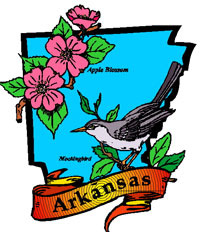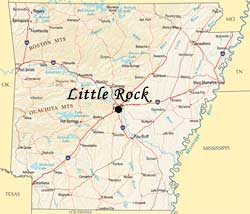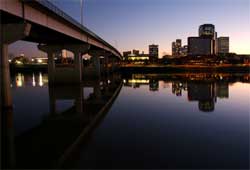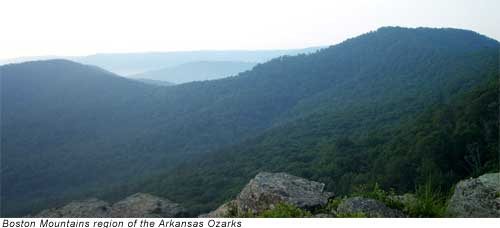
 Arkansas has an interesting history. During the Civil War, the state fought on the Confederate side. However, in 1864 and 1865, the state had both Confederate and Union governments. A dispute over the governorship almost led to a civil war inside Arkansas in 1874. Arkansas has an interesting history. During the Civil War, the state fought on the Confederate side. However, in 1864 and 1865, the state had both Confederate and Union governments. A dispute over the governorship almost led to a civil war inside Arkansas in 1874.
In 1957, President Eisenhower deployed United States troops to Little Rock, the state capital, to ensure that African American students were admitted to a public high school in the state. Bill Clinton was born in the state and later became its governor.
Arkansas gets its name from an Indian word meaning, "land of downstream people." One of the state's nicknames is the "Bear State" because Indians once hunted the brown bear in the state. The abbreviation for Arkansas is AR.

 Arkansas is a West South Central state bordered by Missouri to the north, Mississippi and Tennessee to the east, Louisiana to the south, and Oklahoma to the west. The United States bought the region that is now the state as part of the Louisiana Purchase in 1803. Important cities include Fort Smith, Fayetteville, and Hot Springs. Arkansas is a West South Central state bordered by Missouri to the north, Mississippi and Tennessee to the east, Louisiana to the south, and Oklahoma to the west. The United States bought the region that is now the state as part of the Louisiana Purchase in 1803. Important cities include Fort Smith, Fayetteville, and Hot Springs.
In addition to fertile soil, Arkansas has vast deposits of oil, natural gas, and bauxite. Ninety-five percent of the nation's production of bauxite occurs in the state. Arkansas is the only place in North America where you can find a diamond field. In fact, because of its resources, the state is nicknamed the "Land of Opportunity." Ironically, the state has the second lowest per capita income in the country, according to the 1993 census.

 Arkansas' forests provide the raw materials for the lumber, wood product, pulpwood, and paper industries that have become important to the state. However, the farms of the Mississippi Floodplain and Gulf Coast Plain are the state's most important industries. Arkansas has traditionally been an agricultural state because of its mild climate, long growing season, fertile soil, and abundant rainfall. Arkansas' forests provide the raw materials for the lumber, wood product, pulpwood, and paper industries that have become important to the state. However, the farms of the Mississippi Floodplain and Gulf Coast Plain are the state's most important industries. Arkansas has traditionally been an agricultural state because of its mild climate, long growing season, fertile soil, and abundant rainfall.
Today, manufacturing makes up one-third of Arkansas' gross product. Fort Smith and Little Rock are two important manufacturing regions in the state. Food processing is the leading manufacturing industry in Arkansas. More chickens are raised in Arkansas than any other state and it leads the country in the production of rice.
Most of Arkansas' workers are employed in service industries. These include education, health care, real estate, and retail trade. The production of electrical equipment is also important to the state. Several large store chains have their headquarters in Arkansas.

Arkansas is known as "The Natural State" because of its landscape that includes forests, forested hills, mountains, lakes, streams, farms, valleys, and fertile plains. The Highlands region of Arkansas consists of the Ozark Plateau and Ouachita Mountains in the northern and western parts of the state. The southern and eastern regions are known as the Lowlands. The state has an abundance of wildlife.

Many tourists go to Arkansas each year. Visit the scenic Ozark Mountains where you can bathe in hot mineral springs and explore limestone caverns. Hot Springs National Park, located in the Ouachita Mountains, is a popular tourist attraction.
|